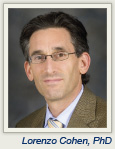More than 14 years after an NIH Consensus Panel finding of “efficacy of acupuncture in adult postoperative and chemotherapy nausea and vomiting,” an informal show-of-hands poll at the Eighth International Society for  Integrative Oncology (SIO) Conference indicated acupuncture was not yet fully integrated into the care provided at participants’ institutions. Results of some acupuncture studies presented at the SIO conference, however, showed the contributions acupuncture can make to integrative oncology care.
Integrative Oncology (SIO) Conference indicated acupuncture was not yet fully integrated into the care provided at participants’ institutions. Results of some acupuncture studies presented at the SIO conference, however, showed the contributions acupuncture can make to integrative oncology care.
Two studies—a small placebo-controlled study reported at the SIO meeting and another recently published in the journal Cancer1—showed for the first time that acupuncture given alongside radiation therapy for head and neck cancer reduced the debilitating side effect of xerostomia. Most current treatments for xerostomia are palliative and offer limited benefit, according to Lorenzo Cohen, PhD, Professor at The University of Texas MD Anderson Cancer Center Departments of General Oncology and Behavioral Science, and Director of the Integrative Medicine Program there.
Profound Medical Implications
The published study involved 86 patients with nasopharyngeal carcinoma, treated at Fudan University Shanghai Cancer Center, 40 randomized to acupuncture and 46 to the standard of care. Those in the treatment arm received acupuncture therapy three times per week during the 7-week course of radiotherapy. The results were based on data derived from two self-report questionnaires and measuring actual saliva flow.
At 1 month after the end of radiotherapy, 54.3% of the acupuncture group reported xerostomia questionnaire scores greater than 30, compared to the control group at 86.1%. (The xerostomia questionnaire includes eight questions about oral dryness and discomfort, each rated on a scale from 0 to 10; the higher the score, the worse the xerostomia.) At 6 months after radiotherapy, 24.1% in the acupuncture group and 63.6% of the control group were still reporting symptoms of xerostomia. Saliva flow rates were also greater in the acupuncture group, starting at 3 weeks into radiotherapy and persisting through the 1- and 6-month follow-up.
“The medical implications are quite profound in terms of quality of life, because while chronic dry mouth may sound benign, it has a significant impact on sleeping, eating, and speaking,” Dr. Cohen said. “Without saliva, there can be an increase in microbial growth, possible bone infection, and irreversible nutritional deficits.”
Encouraging Acupuncturists and MDs to Work Together
 Dr. Cohen is also a Past President of the SIO and moderated a panel discussion about acupuncture at this year’s conference. One of the panelists at that session, Jennifer Stone, a licensed acupuncturist (LAc) from Indiana University School of Medicine in Indianapolis, encouraged physicians to work more collaboratively with acupuncturists to foster “better research, better ideas, and better results.”
Dr. Cohen is also a Past President of the SIO and moderated a panel discussion about acupuncture at this year’s conference. One of the panelists at that session, Jennifer Stone, a licensed acupuncturist (LAc) from Indiana University School of Medicine in Indianapolis, encouraged physicians to work more collaboratively with acupuncturists to foster “better research, better ideas, and better results.”
Physicians would benefit from this collaboration, she said, because the clinical experience of acupuncturists could help in designing treatment plan and research design options. In addition, the generally lower salaries of acupuncturists compared to physicians could help stretch research dollars.
 LAcs would benefit, she said, by increasing their opportunities to publish in MEDLINE-indexed journals, developing university affiliations, and gaining access to research resources, animal and human subjects, and data from pilot studies to help secure funding.
LAcs would benefit, she said, by increasing their opportunities to publish in MEDLINE-indexed journals, developing university affiliations, and gaining access to research resources, animal and human subjects, and data from pilot studies to help secure funding.
As the overall benefit of collaboration, Ms. Stone said, “We end up having better results because we have a more informed team.”■
Disclosure: Dr. Cohen and Ms. Stone reported no potential conflicts of interest.
Reference
1. Meng Z, Garcia MK, Hu C, et al: Randomized controlled trial of acupuncture for prevention of radiation-induced xerostomia among patients with nasopharyngeal carcinoma. Cancer. November 9, 2011 (early release online).

